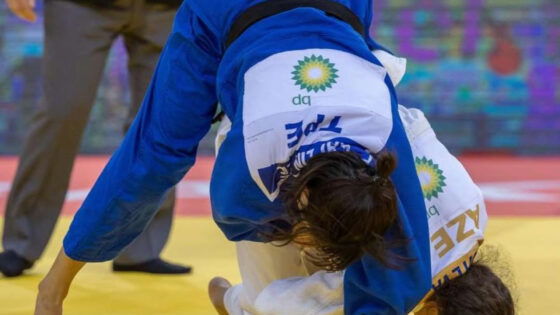“Before the Tokyo Paralympic Games, I had already become a world silver medalist, and I had promised myself that at the Tokyo 2020 Paralympic Games, I would become a Paralympic champion with a gold medal.” These were the words of Shahana Hajiyev, an Azerbaijani judoka. In 2020, she fulfilled that dream, striking gold in the women’s 48kg judo event at the Tokyo Paralympics. But she didn’t stop there. In 2023, she climbed the top step again, and this time at the European Para Championships in Rotterdam, claiming gold in the 48kg J2 category. She was just 25. Her story seemed like one headed for another glorious chapter. Until everything came crashing down.
She was scheduled to compete at the World Para Judo Championships in Astana, Kazakhstan. And then, bam. Shockwaves. The World Judo Championships among Paralympic athletes had just begun in Astana. Azerbaijan’s team was ready—Ismail Muradov (J1, 70 kg), Zakir Mislimov (J1, 95 kg), Khatira Ismiyeva (J1, +70 kg), and Elnara Nizamly (J2, 60 kg). But one name suddenly vanished—Shahana Hajiyeva.
She failed her medical classification. Not injured. Not disqualified for a foul. She was recognized as sighted for someone who competes in the category for partially sighted judokas. Her participation? Canceled. The National Paralympic Committee responded swiftly. In a public statement, they clarified, “At the Summer Paralympic Games in Tokyo, parajudo competitions were held in categories B1, B2, and B3.”
The committee further mentioned, “However, in the run-up to the Paralympic Games in Paris and at the Games themselves, the number of categories was reduced, and competitions were organized in two new categories—J1 and J2. As a result of the changes, many eye diseases previously included in the J2 category were excluded from the list.” They emphasized the blow it dealt to the national team.
The official statement mentioned, “Despite the fact that Tokyo Paralympic Games gold medalist Shahana Hajiyeva represented our country in the J2 category until 2024, due to the changes, it became clear that she will no longer be able to compete in parajudo.” They pledged reform: “The committee is taking all necessary steps to adapt to the new medical classification requirements.”
And they looked to the future: “As the NPC, we are interested in forming a new generation of athletes in all sports… The Children’s Paralympic Games held last year, master classes with Paralympic champions, and our educational work are aimed at achieving this goal.” “The NPC has always advocated for transparency and will continue to take the necessary measures to ensure the successful performance of our Paralympians on the international stage.”
What does it mean for the judoka?
For Shahana Hajiyeva, the failed medical classification test has slammed the door shut on her para-judo career. Once a golden girl of the Paralympics, she’s now barred from competing in her previous category because officials found she no longer fits the criteria for visual impairment. It’s not a temporary suspension. It’s a complete disqualification from Para Judo events.
The ruling effectively ends her Paralympic journey. Her dream run has come to an abrupt, heartbreaking halt—and there’s no second chance on the mat. And while there don’t seem to be any viable options for Shahana to return to the playing field, we cannot say for certain that all is said and done. But one thing that’s for sure is we might not see her competing in the indefinite future.
The post Faked Blindness to Earn Olympic Gold, Judo Star Digs Her Own Grave on Sporting Career appeared first on EssentiallySports.
